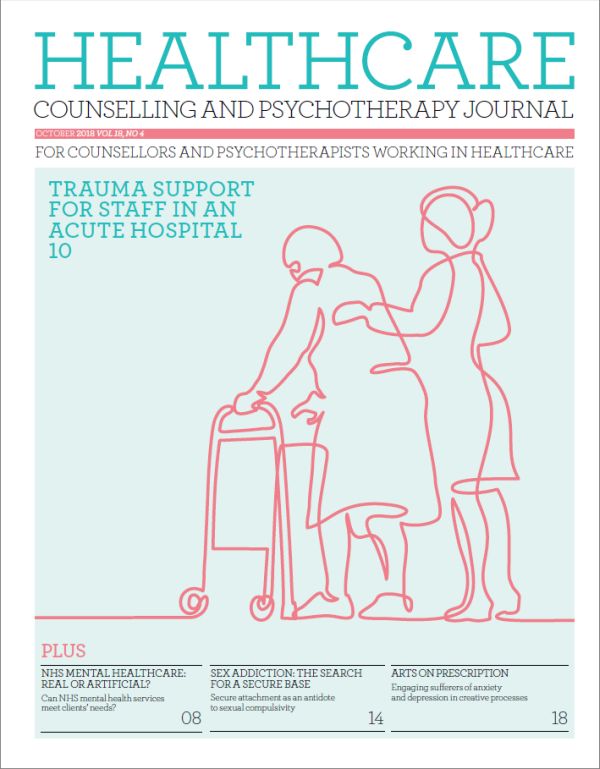In this issue
Features
Trauma support for staff in an acute hospital setting (free article)
Cindi Bedor describes her work in a counselling and support service in an acute hospital
Sex addiction: the search for a secure base
Joanna Benfield proposes an attachment-based approach to working with sexual compulsivity
Arts on prescription
Caroline Wendling, Janet Barraclough, Peter Bailey and Gavin Clayton report on the use of arts workshops in treating depression and anxiety
Regulars
Chair’s report – BACP Healthcare
Satinder Panesar
Healthcare update
Judy Stafford
Counselling in primary care
Elaine Davies
Third sector perspective
Vicki Palmer

A pdf of this issue is available in the Healthcare Counselling and Psychotherapy Journal archive
From the editor
As a therapist working in private practice, I have learnt a great deal from my colleagues in the BACP Healthcare division about working in healthcare settings. Reading and editing articles, attending BACP Healthcare events and having discussions with healthcare colleagues have all provided me with an understanding and respect for the valuable work that you do and the specific challenges of the environments in which you work.
In a fascinating lead article, Cindi Bedor writes about her experiences of working in a counselling and support service for staff in an NHS acute hospital. Her article helped me to understand that all hospital staff, from cleaners to doctors and nurses, are exposed to trauma in one way or another, simply by virtue of being in an environment permeated by illness and death. Reading the article, I reflected that not only do the counselling staff have to contend with vicarious trauma, they are also fully immersed in the often stressful environment themselves.
One of the aims of this journal is to raise awareness of innovative ways of working with our clients. I was, therefore, particularly interested to hear about the ‘Arts on Prescription’ initiative. Caroline Wendling, Janet Barraclough, Peter Bailey and Gavin Clayton describe this social prescribing project, which engages sufferers of anxiety and depression in creative processes. The authors – who include an artist, a therapist and a doctor – are all actively engaged in this Cambridge-based initiative, which offers arts workshops in a museum. GPs are able to prescribe participation in the group as an adjunct to antidepressants or therapy. I was particularly struck by the interdisciplinary nature of this project and the way in which it gives participants a sense of ownership and agency as they engage in creating artwork. The project seems to me to provide an excellent example of best practice, allowing those who are diagnosed with depression or anxiety to experience being part of a group, to build confidence in their own abilities and to access different emotions through creativity, while having the support of a therapist for any difficult issues that may arise during the process.
In the same way that I have been able to learn from colleagues working in the healthcare sector, I hope that my experience in private practice might be of interest to some of you. I have, therefore, shared a little about my own research into sexual compulsivity, in an article that I hope may be just as relevant to healthcare settings as it is to private practice. Sexual compulsivity, or sex addiction, can be defined as out-of-control sexual behaviour, used to manage difficult emotions. This might take the form of multiple affairs, prolific use of pornography or visits to escorts and strip clubs. It is not the behaviour per se that constitutes sex addiction, but rather the fact that the person finds it damaging and wants to stop, but perceives that they cannot. My article explores how an attachment-based therapeutic model can help clients to find healthier ways to manage their emotions, form secure relationships and develop healthy sex lives. I hope this sharing of experience across different working environments may prove useful to you.
In future issues of this journal, we hope to include interviews with our members, in order to demonstrate the rich variety and substance of the division’s work. We would like to feature individuals from NHS services and the voluntary sector who want to reflect on their work, their working environment and their personal journeys as therapists. If you would like to feature in a future issue, or you have a colleague whose work you feel warrants greater exposure, then please do contact me. I would also welcome any other ideas you have for future issues of the journal. This is your publication and it is vital that it reflects your needs and interests.
Joanna Benfield
Editor
hcpj.editorial@bacp.co.uk
